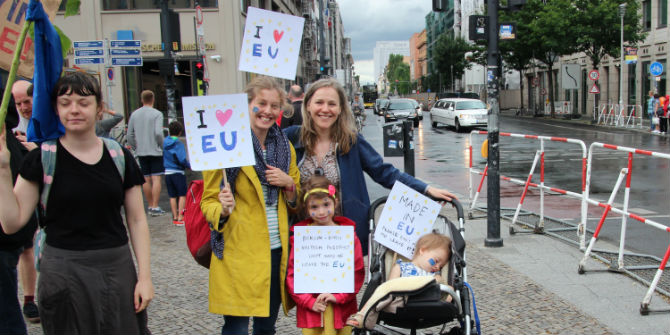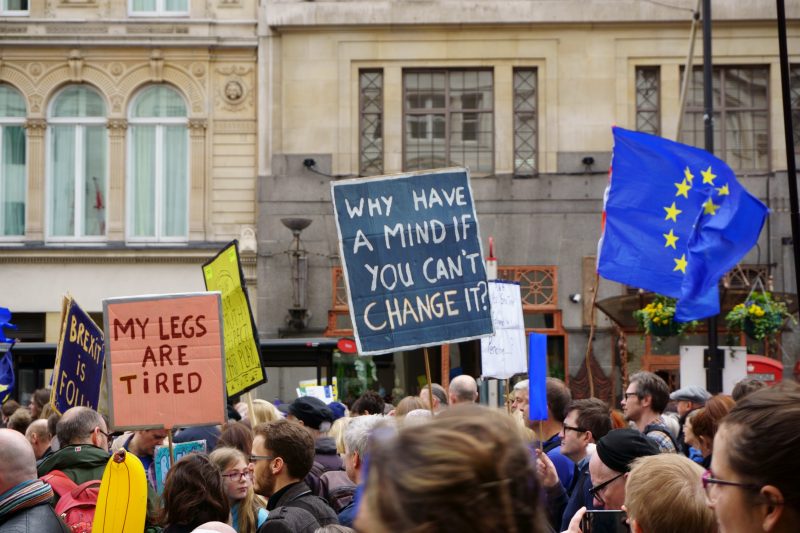 An EU citizen is an EU citizen, writes Tanja Bueltmann, and the government has made it abundantly clear that we are all in limbo until a deal to secure our rights is negotiated with the EU – if such a deal can be done. Politicians have chosen not to oppose the wave of xenophobia sweeping across the country, but to indulge those Leave supporters who want to cherry-pick who stays and who goes.
An EU citizen is an EU citizen, writes Tanja Bueltmann, and the government has made it abundantly clear that we are all in limbo until a deal to secure our rights is negotiated with the EU – if such a deal can be done. Politicians have chosen not to oppose the wave of xenophobia sweeping across the country, but to indulge those Leave supporters who want to cherry-pick who stays and who goes.
No, I was not surprised by the outcome of the EU referendum. It simply confirmed something I had been certain of for months: that xenophobic populism and lies would win the day. While I campaigned strongly for Remain – I could have been wrong, after all – I was thus, in a sense, very well prepared for the morning after. There were no tears. There was no sense of shock. I knew the Leave victory was coming and that was that.
What I was not prepared for was what happened on Saturday after the referendum. There I was, doing some shopping in Newcastle city centre – only to walk straight into National Front members holding a banner that read ‘Stop immigration, start repatriation’. That banner was not new, but the group behind it was clearly seizing the moment. Energised by the Leave result, they shouted that everyone from the EU would be kicked out. Their hate-filled chants are still stuck in my head.
A good 30 minutes later I walked down the street where I live, and ran into my neighbour. Smiling, he said hello, as always, and then proceeded to invite me to a barbecue. How nice of him, I found myself thinking. We had always got on well, but this was a first. ‘What’s the occasion?’ I asked. ‘Oh, we’re just celebrating that we are finally out of the EU – a Brexit celebration BBQ’.
An anti-Brexit demo in Berlin, July 2016. Photo: Elly Clarke. Public domain
I was stunned. He knew that I am German. So I told him that I would not be able to come, as Brexit really was not something I would ever celebrate. As an EU national living in the UK, I said, the vote had pulled the rug from under my feet and would severely impact upon my life. My neighbour looked surprised, and went on to say that I was not the problem, of course. That he wasn’t against me being there, of course. No, I would be fine, of course.
This has been one of the most pervading themes of my life since that day: the idea that, somehow, there is a difference between EU nationals; that, somehow, those perceived as ‘the good ones’ would not be affected by the vote to leave the EU. As I have noted elsewhere, you don’t get to cherry-pick. In fact, I take it as a personal insult if someone tries. An EU national is an EU national. Full stop. We will all be affected in the same way. We are in the same boat. In fact, it is the same boat as those of the Britons who live in another EU country. And even of Britons in the UK who have a partner who is from the EU. All of us have been living in Limboland since 24 June.
And it is largely hostile. With lies and xenophobia the central hallmarks of the Leave campaign, it is hardly surprising that the number of hate crimes went up in the aftermath of the vote. There are warnings already that another spike is expected after the triggering of Article 50. A few months ago I walked down the street talking to my mother on the phone. I spoke German. I was told to ‘f- off back to your country’ by a bystander. Never before 2016, never once, has any such thing happened. But I probably imagined that – or so many Leave supporters gladly tell me all the time.
Instead of standing up to this hate that is spreading across the country, more and more politicians have jumped onto the populist bandwagon, repeating Leave’s lies on the apparent connections between immigration and a broad range of problems in Britain, from housing shortages to GP waiting times. These are connections for which there is essentially no evidence, but many politicians keep making them. The Labour MP and candidate for mayor of Manchester, Andy Burnham, went so far as to argue that free movement was ‘undermining the cohesion of our communities and the safety of our streets’. Politicians who say things like that are playing with fire. It is their rhetoric too, not just that of the likes of Nigel Farage, that fuels hate.
What all this rhetoric is telling me is that I do not belong here. I am foreign, and now frequently described as a foreigner. This, too, is something that never happened before 2016; not to me, anyway. From newspaper front pages to Lord Tebbit’s comments in the recent discussion in the House of Lords, the casting of EU nationals as foreigners who do not belong is now a daily occurrence.
Why is that so? For one, because the UK government is keeping us EU nationals in Limboland. Having made us bargaining chips in the Brexit negotiations, we are reminded every day that were are not seen as part of this country. Apart from the immediate and very negative impact this has on individuals and families across the UK, it also empowers racists who, in the absence of any guarantees, can continue to spin their hateful lines that we will be deported. Even initiatives that highlight our contributions, particularly One Day Without Us, received only limited coverage in the British media, and was essentially hijacked by an anti-Trump protest. EU nationals were not given a voice in the referendum, and even now, as our lives continue to be in limbo, our voices are silenced.
Of course the amendment recently passed in the House of Lords and the report of the House of Commons Select Committee on Exiting the EU are very welcome. But in many ways the damage has been done. And that is because although the UK government keeps saying that all it wants to do is guarantee the rights of EU nationals, it has failed to do so in the more than 250 days since the referendum. Not only that, it made us bargaining chips in the negotiations, and sent some of us letters telling us to prepare to leave the UK. And it requires anyone wanting to confirm permanent residency – for instance in order to get British citizenship – to fill in an 85-page form, with 28% of applications rejected.
These are very clear messages. And they are messages EU nationals in the UK hear daily. Life as we knew it is gone. The question that remains is this: how many of us will take back control … and leave Limboland?
_____
This post was originally published on the Brexit blog.
 Tanja Bueltmann is an Associate Professor in History and Acting Head of Department at the University of Northumbria.
Tanja Bueltmann is an Associate Professor in History and Acting Head of Department at the University of Northumbria.









I’ve seen many misconceptions in these comments about the EU being to blame for our bargaining chip position. It’s a shame that what the EU steps undertaken to help us are not being reported to aid the “they are punishing us for leaving’ narrative. Please type #the3millionMIS for a thread and see what’s gas been done behind scenes before adopting the he above narrative, please.
” We are in the same boat. In fact, it is the same boat as those of the Britons who live in another EU country. ”
The point is, you are not. Your position will be exactly the same the day after Brexit as it is today.. That is how the Common Law works. Your rights can only be changed by an Act of Parliament. British citizens live in 27 other member states whose domestic law will determine whether Brexit changes their status.
The UK has sought a common agreement that UK citizens in the 27 will be treated as you are in UK law, but they have refused. Their refusal does not affect your position. However, should eg: Germany seek to change the rights of UK citizens resident in Germany at Brexit then it is possible that an Act of Parliament may be passed putting German citizens resident in the UK at Brexit in the same position as UK citizens in Germany.
There has been a suggestion that the UK government should make some sort of unilateral declaration that EU citizens will have their rights guaranteed to a greater extent than they already are by law. The Government can give no guarantee that extends beyond the present parliament, even an Act of Parliament would not bind the next government.
The way to secure ensure you would become the subject of reciprocity in the case of a change of the status of UK citizens in Germany is to contact the German Ambassador and German Government and urge them to accept the proposal of the UK government. The same applies to all other nationalities.
Hi Tanja,
Why would you want to stay in this awful country?
Brexit has clearly demonstrated that our politicians are incompetent and irresponsible, our democracy broken and unfit for purpose. As a result, Brexit itself is no longer the issue.
Brexit was not the result of populism (whatever that is), it was the result of stupidity; the stupidity of David Cameron. He and Osborne inflicted ten years of austerity on the country – the worst decade for living standards since WW2 – and then asked the populace if they’d like to blame foreigners for their politicians failure to provide a better standard of living. Duh! What were they thinking? That’s the question trainee rabble-rousers use to get the Mob out on the streets. Basic sociology tells you that’s a stupid question at the best of times; the whole point of politics and all the institutional flummery is to deflect and delegitimize the Mob.
Worse than that, the referendum was never intended as an extension of democracy, but as a ploy in the power-play between the utterly contradictory factions that make up the Conservative party, an outfit united only in its desire to hang on to power at any price. Even Marine Le Pen thinks Cameron is pathetic. Had it been meant seriously, we’d have seen an explanation of the word ‘advisory’ on the ballot paper.
But it went ahead, carefully excluding those with a particular interest and knowledge of the subject (the ex-pats) and the result was declared ‘the will of the people’, in spite of the ‘will of the people’ as expressed in a General Election a year earlier being the exact opposite – the election of a majority of ‘Remain’ MPs. Our most wonderful system of democracy had managed to provide 12 million UKIP voters with just one MP. That was a good way of winding up the Leave campaign – look, everyone, nice simple question and no wasted votes with that ‘first past the post’ piffle. In some ways, it has been quite satisfying to see Cameron’s attempt to block UKIP (which started with rubbishing the Alternative Vote referendum back in 2011) come so spectacularly unstuck.
So now, ‘parliamentary sovereignty’ amounts to the Conservative ‘Remain’ party majority being browbeaten into submission by the Leave minority. It is unclear as to whether the Remainers are simply putting party loyalty before what they used to (or still?) regard as the interests of the country or just too cowardly to face down the ‘will of the Daily Mail’.
As for the Brexiteers, they have been shameless about lying to the voters during the campaign and about threatening anything and anyone who they see as opposition, including the Courts and the Rule of Law. I find it difficult to forgive or forget the ‘Enemies of the People’ headline in the Mail, although the lack of response from our ‘responsible’ politicians was even more appalling. Also, should they ever have lucid moments, the delusional fantasists who appear to be over represented amongst the Brexit MPs might reflect that it is the Rule of Law that, ultimately, stops the electorate going after politicians whose promises turn out to be empty rhetoric.
Brussels is Bad but Westminster is Worse. Kate Heusser (in another comment to this blog) indulges herself in agonizing over the EU’s mistakes whilst acknowledging – but not addressing – our own problems. That’s not clever. We know now (not that we didn’t before) that supporting Brexit only legitimizes and encourages the loonies and the racists. But she does highlight a interesting point; Brexit won’t stop immigration, it will just exchange a cut in East European immigration for a resurgence in sub-continent immigration. Check out Syed Kamall’s views on this subject. He’s been quite open about it, but somehow the rest of the Leave campaign didn’t make this clear. It wasn’t on that infamous bus.
I was interested to read your response to the original post, and your take on my comment, Will Haines.
I don’t, however, find anything interesting in the content of what you have said. There is a lot of anger and contempt aimed at those who voted, as well as those who campaigned for, leaving the EU, but nothing positive – in fact, nothing at all – about the EU itself or our relationship to it. There is partial analysis of the political gamble (it cannot be called a calculation) involved in David Cameron’s decision to promise a ‘new deal’ with the EU and a referendum once it was ready for delivery. There is no acknowledgement that other parties had – and still have – their own difficulties with our relationship with the EU throughout our ambivalent membership of its organisations.
My ‘agonizing’ over the shortcomings of the EU are glancing mentions contained in two short paragraphs within a long comment piece. I agree with you that the ‘Brexit’ campaign was disgusting, as was the sledgehammer with which the ‘Remain’ campaign tried to beat the voter into a submissive pulp. A plague on both their houses.
My comment did not presume to set a forward course for the UK because it was an attempt only at analyzing the factors that really led to the referendum result. If you want a suggestion for the future, then I am happy to supply it but I think I’ve said enough on this thread already.
I can only wonder whether ‘indulging’, ‘agonizing’ and ‘not addressing’ are verbs applied to someone who disagrees with your view that the referendum result is proof that the majority of voters are stupid, racist, or both.
Hi Kate,
You agonise – at length – about the ‘closed’ nature of the EU, especially on immigration, but this is another ‘Brexit’ myth, like Boris’s ‘straight bananas’. Non-EU immigration is still above EU immigration (House of Commons Briefing Paper SN06077 Section 2.4 Table1). Exotically, you want an immigration policy based on expiating the guilt of the Empire in exploiting the colonies. Well, good luck with that one -in case you hadn’t noticed, your fellow Brexit travellers are busy turning immigration into a morality-free deadzone where even the country’s economic self-interest is struggling to be heard. That’s why Tanja is faced with an 85 page interrogation if she wants British citizenship.
I am sorry that you are not satisfied with open trading within 28 countries, because it is not the entire world. Are you suggesting it’s unfair to stop China dumping its excess steel on us and putting our steelworkers on the dole?
My anger and contempt is aimed squarely at our politicians and political system that have served us (all of us!) so badly over this issue, not my fellow voters. I am quite sure that I didn’t say that the majority are racist. I would have put on a false beard and voted for UKIP if they had come out against the Conservative Austerity Project, which is the real problem this country faces and where there is No Parliamentary Opposition (there, I’ve mentioned the Pathetic Parties – satisfied?). I’m just sorry that you’re not interested in any of this.
Hallo Tanja.
It’s sad to hear that you were abused for speaking German. As you can see from my surname, I’m married to a ‘foreigner’ (my husband is Swiss). I’ve had curiosity, but never hostility, about my name. My German isn’t good enough to test out the speaking of a foreign language in public to see what happens.
I voted to leave the EU. If you’re still reading after learning this, you may be interested to hear why.
I don’t like the one-size-fits-all policies of the EU. I don’t like its Grand Plans. I don’t like its lack of – its paternalistic opposition to – national democracy.
I don’t see openness in the EUs attitude to trade, but just an enlargement of protectionism that unfairly restricts trade from non-EU countries.
I don’t see an increase in freedom of movement of the people of the world, but only encouragement of movement from home community for people within the small geographical area that is the EU.
The UK has particular ties to countries outside the EU – ties of kinship from previous immigration from the Commonwealth, and of obligation to the nationals of those countries our ancestors previously colonised and, yes, exploited. To my mind, those ties give people from those countries a prior claim to our loyalty and first refusal on any immigration into the UK. This is very different from the position of the rest of Western Europe where, for the most part, the political patchwork of national borders has cut through family ties, loyalties and identities.
As you can tell, my attitude towards the EU has been formed over decades and not by the appalling excuse for a ‘debate’ wished on us by the vicious campaigns of both camps and their followers during the run-up to the vote. Those campaigns were a national disgrace. I’m delighted that Mr. Farage was dumped unceremoniously, and that the person heading the country during the exit process is someone who originally, and on balance, supported her then Prime Minister’s recommendation to stay in the EU but has accepted the population’s decision not to do so.
There are many ways in which the EU has been made scapegoat by Westminster over the decades for our own Governments’ repeated failures to address the needs of its own population. In many ways, the policies of Germany have been far more attuned to what the UK population would have wanted and, on leaving the EU, our Governments will no longer be able to hide behind ‘Brussels’ to excuse itself. In addition, many of the initiatives most complained about in the UK will undoubtedly have been supported enthusiastically by British politicians and officials in Europe.
I think the primacy of the ‘four freedoms’ so beloved of the EU have proved its downfall in the UK. Here, the ‘freedom of movement’ is not seen as a particular benefit for individuals but as a cynical convenience for big business. British citizens who want to move to other countries for their own reasons tend to believe they have the whole world to choose from. Those who are ‘moved’ by employers see this as something done to them, and they resent it. The vast majority of the population have neither the wish nor the opportunity to uproot themselves from their families and friends. Perhaps because there is no land border (except, of course, to our island cousins and neighbours in the Irish Republic, the joy and convenience of having no political border doesn’t have the same resonance for us. On the other hand, the ease with which businesses can avoid the need for providing proper training and the normal wage pressure of full employment by importing recruits from lower-wage countries has had a demoralising effect on the majority. Add to that the facts that our housing market is run as a business and not a resource, that UK citizens visiting other EU countries have to show entitlement to health benefits while our own NHS has a visceral cultural resistance to making the same demand of visitors, and that our public services have been starved of funding while the population size, fuelled by unprecedented levels of immigration, is rising at a ridiculous rate, and the pressure has become unbearable.
The UK owes an apology to the founding six members of the EU. The way in which the EU was sold to UK citizens in the first place was as a trading club. Its political aims were skirted over, treated as pious dreaming, even denied. General de Gaulle was absolutely right in his understanding of Britain’s position – we were never a fit for the European dream. Our governments should never have been allowed to sign us in. Our candidacy should have been vetoed by the EU (the Communities) or swiftly reversed by us. We then pushed our idea of enlargement to the present 28 member states, so changing the nature of the planned community and making the whole fare more unwieldy and disparate than it needed to be. We need to pay our debts, to ensure as far as we can that our departure causes as little economic damage to our giant neighbour as possible, and to part with our apology and our sincerest best wishes for the future.
EU barometer figures suggest that there is no ‘wave of xenophobia sweeping across the country’. UK attitudes towards EU immigration have become more ‘pro’ and less ‘anti’ between 11/14 and 11/15 and between 11/15 and 11/16. The same is true for non EU migration.
Moreover, the UK has tended to become more ‘pro’ not just in absolute terms, but also relative to the EU average.
Before someone shouts ‘post truth!’ , these facts are all freely available from Eurobarometer. I am not a Gradgrindian when it come to facts – there is a context to facts. I am not complacent – racism should be confronted and the government should have guaranteed EU residents their rights on day 1 post EU referendum. However, there is no tide of hate sweeping the nation.
There are deplorable racists standing outside Newcastle town hall (as the author admits, they were not a Brexit phenomenon). Then there are the vast, vast majority of Brexit voters. The author’s neighbour did not express the view that anyone at all was unwelcome, and it is unfair to suggest otherwise in the article.
As for picking and choosing who is welcome, this is what immigration controls do and always have done, both for nations and for the EU. Within the EU, EU workers are welcome to travel. Africans are not welcome to do so.
I think that the failure of the government to guarantee EU workers rights post Brexit was very wrong, as is a lot of what they do. But I think a further point is worth making – if Brexit and Brexit voters are falsely labelled as part of a tide of hate, as part of a continuum that starts with a vote to leave the institution of the EU and ends in the National Front, then that is not likely to help anyone. I hope no one will leave ‘limboland’. Stay and fight for a more open immigration policy if you believe in that. Judging from the figures, you may well have more success here than in most of the rest of the EU.
I do share the author’s point about onedaywithoutus . I supported the event at my workplace, but in my town the main event was a joint one, explicitly for stopping Trump. It was also explicitly for stopping Brexit itself as it was co-organised by Unite for Europe (a group explicit in their aim to overturn the Brexit vote I believe). Local solidarity with EU colleagues was posed as something for Remain voters and those against Trump’s visit, with Leave voters presumably assumed to be intolerant.
Thank you Mr. Butcher. What I liked most about your comment is that it is impossible to discover from it whether you support either leaving or remaining within the EU or any of its institutions. Genuinely objective views on Brexit (revolting word, but I think we’re now stuck with it) are very hard to come by in these days of increasingly hysterical polemic from all quarters.
“EU barometer figures suggest that there is no ‘wave of xenophobia sweeping across the country'” This comment was untrue when you wrote it and it is even less true now. When senior police officers speak about ever increasing waves of xenophobia denying it is not very clever in my humble opinion. It is notable that the most coherent comments here are those from Tanja Bueltman and Kate Heusser both with connections with Europe and therefore the most directly affected by the referendum result.. In the other comments various subjects are touched upon, bananas and China for example but no attempt is made to address the problem raised by Tanja. Unfortunately that is how it is in Great Britain 2017.
I’m sorry to hear about your predicament but it is the Eu that is using you as a bargaining chip in their refusal to give reciprocal rights to uk citizens working in mainland Europe. Similarly it was the Eu that refused to renegotiate freedom of movement. Therefore Id suggest you take your issues up with your own government and ask them why they are refusing to guarantee rights for uk citizens and why they were unwilling to renegotiate freedom of movement rather than blame our government.
Lastly perhaps you need to take responsibility for your decision to move to a well-known euroskeptic country in the first place. If filling out an 85 page form is too much of a nuisance for you then don’t fill it out!
Regrettably it is due to people like Merkel who started the hate canpaign with her attitude.
My way or the highway. Make it difficult for the UK exit from what can only be described as a failed undocratic experiment that is collapsing with France getting ready to leave along with Holland. Greece is broke thanks to Germany. The Euro is failing, So many countries now have desperate issues with the immigrants from all over who Merkel invited and insisted in open borders. STUPIDITY RULES IN THE EU ! When was the full audit carried out ? Oh it has’nt yet ! Duh.
I fail to recognise my country since this lunacy of Brexit took over, like some mind-altering drug that half the population apparently inhaled. There was no logic to the arguments presented in the charade of a “debate”; there were no facts; there was no intelligence displayed. What the country was treated to was a public display of intra-Right quarrels over how xenophobic, racist and just plain nasty the UK should become.
It is therefore no great suriprise that several categories of British voters fell into the trap — many of them without a history of supporting the racist Right. Some of these were self-taught xenophobes — including immigrants who thought that they had safely assimilated as British and could arrogantly exclude others. Yet others were vulnerable older people, fearful of the potential hordes of Muslims waiting to take control of the UK once allowed to enter. Yet others were out-and-out rather nasty racists, who probably voted BNP or UKIP on several occasions. The real question though is how many voted for Brexit without actually thinking properly — not understanding the momentous consequences of such a decision. This is the argument for another referendum — along with the facts that the result was marginal and the whole campaign was nothing other than lies and fear-mongering on both sides.
My fear is that having made the primary error of holding this absurd referendum, cementing its result by putting into unelected power one of the most unpleasant and dangerous right wing politicians today as PM, the UK has forced itself into a corner and does not have a clue how to get out of it. Some of the old Tory grandees, like Heseltine, are showing their patriotism and sincerity, but they are a minority. The Labour Party is a joke, and does not constitute any opposition to the Government. The probability is that the UK will sign its own death warrant, and its citizens will cheer as the economy declines and educated people quit the country in droves. That will include Brits as well as all other EEA nationals, and will signal the inevitable arrival of Poverty UK — offset only by the handful of non-tax paying billionaires residing (or not) in central London.
As a Brit living in Spain I can sympathise with your predicament. We too are living in a kind of limbo waiting for decisions to be made by people we cannot vote for despite remaining British taxpayers. The one big difference is that we have had no experience of the awful things that EU citizens in the UK such as you have to face. Spaniards are universally puzzled by Brexit and very sympathetic to those of us affected. That is why we hope to take out Spanish nationality and return to the country of birth, and its xenophobia, as little as possible.